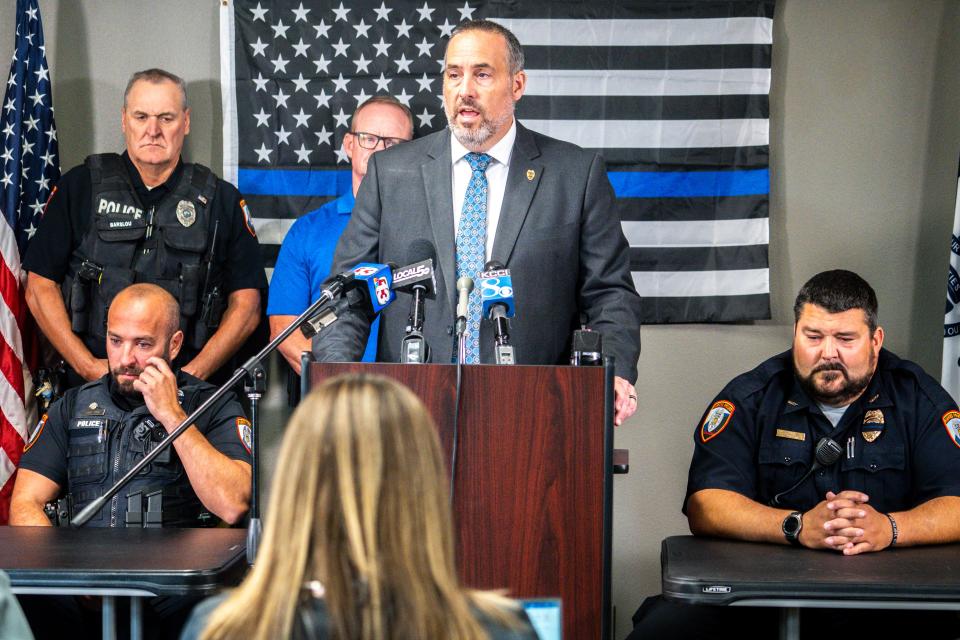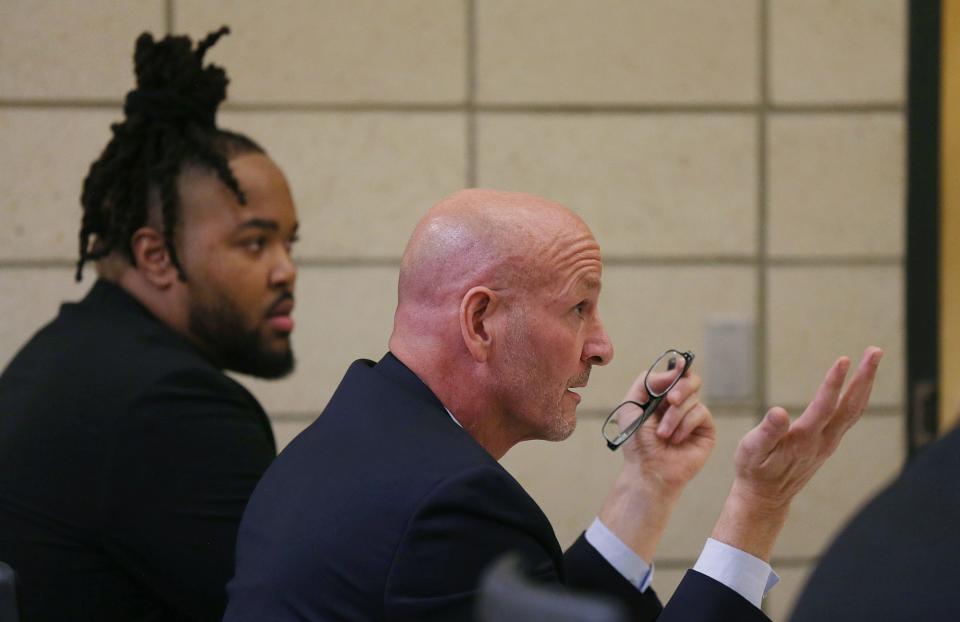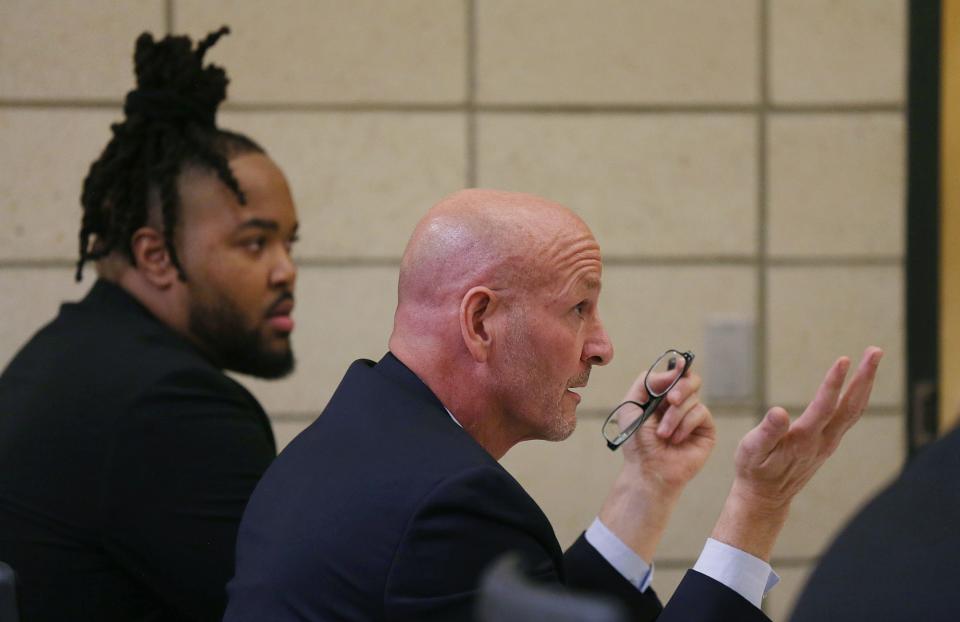Attorneys for Iowa State University athletes charged in a gambling probe accused Iowa Department of Public Safety Commissioner Stephan Bayens’ office in a statement Monday of withholding evidence that favored their clients’ now-dismissed cases.
Lawyers Matt Boles and Van Plumb, along with members of the Sandy Law Firm, said in a joint statement that the Department of Public Safety failed to disclose that investigators lost access to software for tracking apps such as those used for online betting after the manufacturer withdrew it over concerns they may have misused it.
The defense attorneys said they discovered that information through an open records request, which prompted them to file a motion last week to suppress evidence. On Friday, citing their discovery, Assistant Story County Attorney Benjamin Matchan asked a judge to dismiss the charges against four former Iowa State athletes.

The lawyers’ statement Monday was in response to a one Bayens issued Friday afternoon, defending the gambling investigation. They called Bayens’ statement “deeply concerning.”
“DPS doubling down on its support of (the) investigation is alarming, and its failure to disclose some of the aforementioned exculpatory information to the prosecution appears to have been concerning enough for the Story County Attorney’s Office to dismiss its pending criminal cases against our clients,” the lawyers wrote.
Story County Attorney Tim Meals did not return multiple messages seeking comment Monday. DPS spokesperson Tawny Kruse said the department would not comment on the case beyond Bayens’ statement, in which he defended the actions of the Division of Criminal Investigation, which is part of the DPS.
GeoComply said months ago it was preparing to end DCI’s access to key software
The DCI launched the investigation into gambling among Iowa State and University of Iowa athletes last year. The case drew criticism in January after the athletes’ lawyers in court motions said the chief investigator, DCI Special Agent Brian Sanger, disclosed in a deposition that he had used the tracking software without a warrant. The lawyers have not shared the transcript of Sanger’s deposition.
In 2022, GeoComply gave Sanger and other agents access to the software, called Kibana, which allows users to see where people are opening sportsbook apps like FanDuel and DraftKings. Sanger allegedly used the software to track whether people were using the apps inside University of Iowa athletic buildings. According to defense attorneys, the DCI then tracked similar activity inside Iowa State athletic buildings.

Prosecutors brought criminal cases against 24 athletes and student managers, accusing the defendants of underage gambling and identity theft. The latter charge was based on athletes’ alleged use of betting apps registered to family members or friends.
Defense attorneys for four former Iowa State athletes filed a motion to suppress evidence Friday, revealing that the DCI lost access to the bet-tracking software in January.
On Oct. 26, emails show, GeoComply Government Relations Director Gabrielle Angle told Iowa Racing and Gaming Commission officers that the company was “drafting a letter confirming that we intend to turn off Kibana access for the DCI.” The gaming commission is separate from the DCI and regulates sportsbooks.
Angle then informed the gaming commission in a Jan. 25 email that GeoComply would cut off the DCI’s access to Kibana the next day because the department’s investigators “may have exceeded the intended and outlined scope of its Kibana access-and-use privileges.”
A GeoComply spokesperson did not respond messages from the Des Moines Register seeking comment. Matchan, the Story County prosecutor, in his motion to dismiss the charges Feb. 27 said GeoComply officials also had not responded to his messages.
DCI defended case after after software access shut off over misuse concerns. Should athlete’s lawyers have been alerted right away?
In their statement Monday, the defense attorneys attacked the DPS for issuing a statement Jan. 31 in which it defended defending the DCI’s investigation. The DPS said DCI agents had consulted with an unnamed lawyer to ensure their use of Kibana was legal.
At the time of that statement, the defense attorneys noted Monday, GeoComply already had stripped the DCI of the bet-tracking software.
The lawyers added that they did not learn about GeoComply’s actions until late February, when the gaming commission provided emails to the Spirit Lake-based Sandy Law Firm in response to its open records request.
“DPS knew, or should have known, that the stated basis and ultimate termination of DCI’s Kibana access was exculpatory evidence that should have been disclosed to the State prosecuting the individuals criminally charged in DCI’s collegiate gambling investigation,” the defense attorneys wrote.
In his statement after a judge dismissed the charges, Bayens implied that the Story County Attorney’s Office backed down from the cases because of public pressure.
“Had this situation not involved college athletes, the public perception may have been entirely different,” he said.
The judge dismissed cases against former Iowa State running back Jiherl Brock, defensive lineman Isaiah Lee, wrestler Paniro Johnson and defensive end Eyioma Uwazurike.
DCI Assistant Director David Jobes told the Register on Jan. 23 that the probe netted 16 guilty pleas. A judge moved one case to juvenile court, where proceedings are private. Prosecutors dismissed one case in September, against former Iowa State tight end DeShawn Hanika.
Tyler Jett is an investigative reporter for the Des Moines Register. Reach him at [email protected], 515-284-8215, or on Twitter at @LetsJett. He also accepts encrypted messages at [email protected].
This article originally appeared on Des Moines Register: Iowa investigators withheld evidence, ISU athletes’ lawyers say
